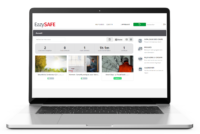Reporting Covid-19 risks. Is your business ready?

ANDY TILLEARD
EHS Consultant
EazySAFE
As the Covid-19 pandemic bites deeper, some workers are understandably becoming concerned about how their employer implements government Covid-19 guidelines.
They may hold a different view from their employer on how their workplace should be kept/made safe.They may see shortcomingsin how safety procedures are being put in place, and how they are implemented in practice. They may feel unsafe in the workplace.
Workers know that their employer is balancing not only the health and safety of employees but also the economic interest of the business.With much uncertainty around the Coronavirus, the number of workers making complaints to or about their employeris rising.
In Canada, workers filed thousands of complaints with the Health and Safety authorities about unsafe working conditions as Covid-19 swept across the country. There is no reason to see how this will be different in Ireland.
Internationally there are also a growing number of cases where employers retaliate against workers who raise such concerns. One employee rights helpline in the US found that nearly half of employees with Coronavirus concerns had been ignored by employers while a fifth of these workers was dismissed for raising concerns.
In the UK more than half of whistleblowers surveyed reported some form of negative treatment: 26% were victimised or disciplined, 21% were dismissed and 2% were bullied by co-workers. In addition, 6% reported that they had resigned and a further 2% reported the suspension.
How does this apply to the Health and Safety manager, HR manager or CEO in Ireland?
The Irish government has published the Work Safely Protocol, the updated revision of the Returning to Work Safely Protocol, which contains current advice on how to work safely during the pandemic.
All businesses must implement these protocols before staff return to work. This includes those working from home.
Before returning to work, employers must ensure it is safe to do so. If an employer refuses to meet their obligations, workers may make a complaint to the Health and Safety Authority. If an employee refuses to return to work because of safety concerns, and they are dismissed, and they can prove the workplace was unsafe, they may take a case for unfair dismissal.
As part of this protocol, strong communication systems must be in place to effectively implement Covid-19 safety measures.
Included in this protocol is the role of Lead Worker Representatives. Lead Worker Representatives must be appointed from among staff, and they work closely with the employer implementing and monitoring the safety procedures. All staff should be informed who this person is. The representative should also assist in communicating the new safety measures to staff. They must also make themselves available to their co-workers to listen to any Covid-19 concerns or suggestions they may have. They must inform management of these concerns and suggestions, and feed this back to their colleagues.
If a member of staff is unable or unwilling to engage with the company through the Lead Worker Representative or directly with their employer, they can make a complaint directly to the Health and Safety Authority. The Health and Safety Authority have a confidential online complaints form and hotline.
Legislation is in place which requires employers to implement certain procedures to protect those who speak out, namely the Protected Disclosures Act (2014). This is one of the main “whistleblowers” pieces of legislation in Ireland. The Health and Safety Authority may accept Protected Disclosures, under certain conditions. Any Protected Disclosure Maker can make a Protected Disclosure where they believe there is wrongdoing by their employer.
Employees are advised that they should first raise their concerns with their employer. If the complainant does not feel comfortable with this, they may raise the issue with their Lead Worker Representative, union representative, or worker representative. If the employee is working for a public body, they can make their complaint to the relevant government minister. An agency workers’ employer is legally their agency.
Employers and other recipients of a Protected Disclosure must protect the identity of the complainant.
Although only public bodies are required by law to have whistleblowing procedures in place and ensuring their staff are provided with the written procedures, many employers are now doing the same.
Good employers seek to correct bad practices and implement best procedures, and are in the best position to put things right quickly.
So, it is very important that businesses put suitable structures in place that ensure their workers can communicate effectively their concerns about Covid-19 in the workplace, that they will not be penalised by their employer, and that they comply with Health and Safety and whistleblower legislation. All staff must know these procedures.
How employees can voice their concerns in a safe manner is very important, and is a good indicator of the culture in the company. Their concerns and suggestions should be listened to, improvements made where suitable, and the worker should feel that they will not be victimised for speaking out.
For EHS Support, please get in touch.

Discover our Safety Training Platform
Train your employees anytime, anywhere with our environmental, health, safety and wellness training platform.

TAILORED TRAINING
Discover our safety training courses and ehs onboardings, which can be customised and offered in several languages.

SAFETY MANAGEMENT
Ensure the distribution of your safety policy by training your permanent, temporary or seasonal staff.

GLOBAL MONITORING
Simplify the management of your safety policy thanks to the numerous dashboards and training reports.
